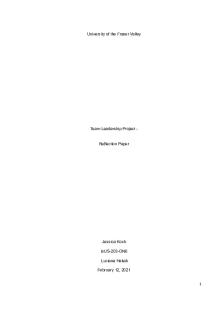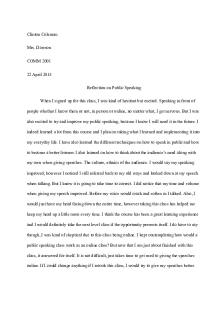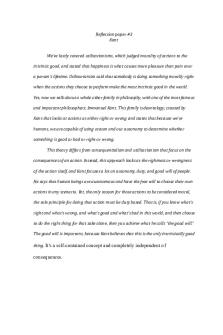BIOLOGY 320 M1 Reflection PAPER PDF

| Title | BIOLOGY 320 M1 Reflection PAPER |
|---|---|
| Author | hailey williamson |
| Course | Hum Anat Phys I Bio Maj |
| Institution | Eastern Washington University |
| Pages | 2 |
| File Size | 67.4 KB |
| File Type | |
| Total Downloads | 36 |
| Total Views | 164 |
Summary
BIO 320 M1
REFLECTION PAPER
HAILEY WILLIAMSON
BIOLOGY 232
HUMAN ANATOMY...
Description
Hailey Williamson BIO 320 M1 Environmental Ethics Reflection January 15, 2019 I do believe climate change to be a moral issue. After going through module 1, I have come to the conclusion that morals should play a big part in making environmentally conscious decisions. The three sets of principles that were mentioned in A Short Course in Environmental Ethics By Keith Warner, the ethical perspectives talked about in the lecture video, along with the stages of grief discussed in the Bill Nye film Global Meltdown all led me to understand why climate change is in fact a moral issue. The moral reasoning behind environmental problems is what was so compelling and interesting to me. Although I had always understood climate change and the effects of global warming on our environment, understanding climate change while using moral reasoning was completely altering to my understanding. A Short Course in Environmental Ethics written by Keith Warner highlights the principles that he believes are key in moral reasoning regarding environmental issues. The three principles that are talked about are justice and sustainability, sufficiency and compassion, and solidarity and participation. Justice and sustainability means that equals should be treated equally. Warner talked about this in his paper and applied this to real life by saying there are people that do not have clean resources such as water, food and air. Specifically people in lower income communities, which oftentimes mean lowerincome families. Using justice as a principle when making decisions regarding climate change will lead me to think of options that will help everyone an equal amount rather than benefiting one specific area or group of people more than another. This will also include the future generations and those not born yet. While dealing with climate change we often do think of what we can do to benefit our environment for ourselves. When applying justice and sustainability we must think with the unborn in mind and how we can treat them as fair as ourselves. We must ask ourselves who will be affected by this problem today, and in the future by this problem. Another question Warner mentions that we must ask ourselves is are all humans being treated equally? When weighing the consequences of an action we must look at not only the immediate effects but also the long-term effects of the problem. This is just one of the principles described by Warner, the second was Sufficiency and compassion. This principle stood out to me the most because in contrast to the first principle of justice and sustainability, sufficiency and compassion can be described by saying all forms of live are entitled to enough goods to live on and flourish. This is a minimalistic view that says no one shall waste or hoard resources. When considering what each of us must do for the environment we must include the needs of others in our consideration of what is important. This principle underlies the practice of empathy. Being empathetic of others is a essential when making morally sound decisions regarding climate change, because it will affect every other person on the planet and those who will follow us as well. It was reiterated in Warner’s writing that the future of humans is connected to the prosperity of all other living things. Climate change without a doubt has an effect on us as humans. Using the moral principle of sufficiency and compassion, it is demonstrated how the climate affects the land and animals and in turn effects our own kind rather simply. A question that Warner’s asks the readers is what would this mean to extend the principle of compassion to non human creatures. This is something that morally would affect the way we make decisions that could affect our planet and all creatures living on it. The third and final principle in moral reasoning is solidarity and participation. This idea of solidarity and participation invites us to consider how we relate to each other in a community. This drives us to be inclusive when making environmental decisions that will affect more
than just ourselves. Makes us think about other living creatures and how our actions will affect their quality of life. We must think and care beyond our own communities, and extend our thoughts to other lands and species. When dealing with an environmental issue, using the solidarity and participation principle will force us to consider if everyone will have a say in the decision at hand. In the lecture we were taught about more principles that affect the way we make decisions. The many principles and perspectives are proof to me that climate change is a moral issue. Many of these principles require deep thought of not just oneself. Making morally sound decisions in a climate change based issue will produce a different outcome if you were to use scientific or strictly analytical based principles. One widely known perspective that we talked about and saw when doing the trolleyology experiment was utilitarianism. Utilitarianism is doing whatever will produce the most good for the greatest number of people. In the trolleyology experiment we saw an example of utilitarianism when there was the option to pull the lever on the train tracks in order to save the five people, but in turn kill the one. Another classical ethical perspective we learned about is moral rules and duties. The bible is a good example of this one because God lists commandments which are rules that believers follow. Moral rules and duties are doing what is considered right and wrong and believing that it is our duty to accomplish those duties. Other principles we discussed include autonomy, virtues, and justice. We questioned whether the decision accounted for moral principles such as sufficiency, compassion, solidarity, and participation. All these perspectives, although differ in ways, all involve the use of morals when making decisions. In regards to the environment and climate change we can see that after examining all the different principles and perspectives one may have when dealing with issues of this category, it is without a doubt a moral issue. In the Bill Nye video Global Meltdown we saw the stages of grief when dealing with climate change. I think this furthermore proves that climate change is indeed a moral issue because some are choosing not to believe in it when there is clearly evidence. Denial leads to extreme measures such as the politician in the video who was avoiding the very words “climate change” when publicly speaking. After this stage come the anger stage. Which to me I see passion within many of the people who we heard from in this portion of the film. Once people fully understand climate change and the damage that is happening around us all of our decisions become a moral issue. That is why people like Malina from the film found herself so passionate when talking about the issues going on with global warming. Malina said at one point that elders have said “if you destroy the land, you destroy yourself”. This is absolutely true and I believe that people are realizing all the moral principles behind decisions regarding climate change and wanting to make a change....
Similar Free PDFs

BIOLOGY 320 M1 Reflection PAPER
- 2 Pages

Reflection Paper
- 2 Pages

Reflection Paper
- 4 Pages

Reflection Paper
- 2 Pages

Reflection paper
- 3 Pages

Nur 320 Nutrition Paper guideline
- 11 Pages

Reflection Form EE Biology
- 3 Pages

Reflection paper for pino
- 2 Pages

Conflict Reflection Paper
- 8 Pages

Haudenosaunee reflection paper
- 3 Pages

Reflection paper rubric 05
- 1 Pages

Managment Reflection Paper
- 12 Pages

Reflection Paper chapter 5
- 1 Pages

Bev Reflection Paper 1
- 4 Pages

Paul Simon Reflection Paper
- 2 Pages
Popular Institutions
- Tinajero National High School - Annex
- Politeknik Caltex Riau
- Yokohama City University
- SGT University
- University of Al-Qadisiyah
- Divine Word College of Vigan
- Techniek College Rotterdam
- Universidade de Santiago
- Universiti Teknologi MARA Cawangan Johor Kampus Pasir Gudang
- Poltekkes Kemenkes Yogyakarta
- Baguio City National High School
- Colegio san marcos
- preparatoria uno
- Centro de Bachillerato Tecnológico Industrial y de Servicios No. 107
- Dalian Maritime University
- Quang Trung Secondary School
- Colegio Tecnológico en Informática
- Corporación Regional de Educación Superior
- Grupo CEDVA
- Dar Al Uloom University
- Centro de Estudios Preuniversitarios de la Universidad Nacional de Ingeniería
- 上智大学
- Aakash International School, Nuna Majara
- San Felipe Neri Catholic School
- Kang Chiao International School - New Taipei City
- Misamis Occidental National High School
- Institución Educativa Escuela Normal Juan Ladrilleros
- Kolehiyo ng Pantukan
- Batanes State College
- Instituto Continental
- Sekolah Menengah Kejuruan Kesehatan Kaltara (Tarakan)
- Colegio de La Inmaculada Concepcion - Cebu
